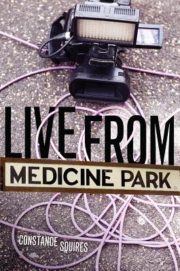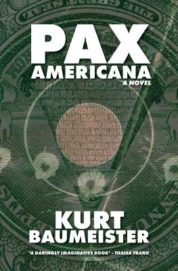
Live from Medicine Park is a pure distillation of the dream that is America, one with little time to waste on the clichéd façade of hard work and success we so often associate with that dream. A tale of anonymity, fame, redemption, and remembrance that rises like myth from the sweltering heartland itself this is, nonetheless, a deeply realistic story of postmodern America, of disappeared rock goddesses, space-suited guitar wizards, Toyota dealerships, documentary filmmakers, and last gasps at fame. Filled with characters struggling more than they know, Live from Medicine Park is an unflinching portrait of America’s realities, Constance Squires just the sort of clear-eyed stylist to steer her characters and America towards the truth about themselves.
—Kurt Baumeister
Constance Squires is the award-winning author of Live from Medicine Park, Along the Watchtower: A Novel and the forthcoming story collection, Hit Your Brights. Her numerous short stories have appeared in Guernica, Shenandoah, Atlantic Monthly, and other magazines. She teaches creative writing at the University of Central Oklahoma.
Brilliantly plotted and linguistically nimble, Kurt Baumeister’s Pax America is a high-flying book as arch as it is deft. The spy thriller plot, particularly as we know it from James Bond films, serves as a surprisingly flexible skeleton for Baumeister to tell a dystopic tale of a not-too-distant American future after thirty plus years of right wing control. Part satire, part homage to the form, Pax Americana also resonates with other parodies like Archer and the Austin Powers movies—there’s an unabashed glee in playing with the loopier elements of the genre—hidden islands rigged out with nuclear devices, sharks, henchmen, allegorical names, and a suitably oh-no-whoever-controls-it-controls-the-world Maguffin in the form of a technology, called Symmetra, with vast, cryptic spiritual power. Beneath all the fun, there’s a serious critique of tendencies in our culture that are scary, but in a way that makes considering them go down as easily as a Righteous Burger. James Bond for the #MeToo moment.
—Constance Squires
Kurt Baumeister has written for Salon, Electric Literature, The Rumpus, and others. His debut novel, Pax Americana, was published in 2017. He is currently at work on a novel, The Book of Loki, and a hybrid collection of fiction, nonfiction, and poetry entitled Superman, the Seven Gods of Death, and the Need for Clean, Romantic Poetry.
Kurt Baumeister: Connie, I’ve been eager to talk to you about Live from Medicine Park. First off, let’s cover the fact that this is a Rock n’ Roll Novel. More specifically, this is a book with a certain kinship to Great Jones Street, one of our mutual hero Don DeLillo’s earliest books. The books seem like mirror images in a way; in Great Jones Street, rock star Bucky Wunderlick is trying to escape fame. In yours, you’ve also got a rock star at the center of things, Lena Wells, but Lena’s trying to regain the fame she lost decades earlier. Do you think this is a fair comparison?
Constance Squires: I love Great Jones Street and definitely wanted to tip my hat to it in the media kit section of Live from Medicine Park. There’s always a question of how to represent the music on the page in a book that deals with music, and of course you always want whatever you do to deepen character, so I wrote a media kit inspired by Great Jones Street that contained Lena’s lyrics and some reviews. I wanted the lyrics to show sides of her that she wouldn’t show Ray in person. I don’t go so far as to think of my story as a reversal of Great Jones Street, though, mainly because Lena’s not the main character and her ideas about her career and music aren’t what drive the story. Lena is sort of a Gatsby figure, someone who the main character, Ray, thinks a lot about, but she probably changes less than anyone of the other key characters. She’s at the heart of the book, but she’s not the engine.
KGB: The idea of Lena as a Gatsby figure is an interesting one. DeLillo and Fitzgerald share an iciness in tone, a detachment critics have commented on. I don’t notice that with your work. In fact, the balance you show in developing and presenting emotional conflict is striking. Live from Medicine Park is no tear-jerker, but you take quite a few characters here and give them meaningful inner lives, even the minor ones. Is there a sort of North Star you look to as you develop characters, something that helps you succeed in developing their interiority?
CS: Thank you! I know what you mean about DeLillo’s iciness, and I’m glad to have a warmer book. I think we’re all trying to write the kind of book we’d like to read, and everybody has a different set point for what they want in an emotional conflict. I’m bored and sickened by sheer melodrama, but stuff that’s too ironic and glib feels almost like cowardice to me, like a writer not wanting to go there. I think in life I try to notice this tendency in myself when it comes up and then to make myself think about or feel or act on whatever it is that’s uncomfortable, so maybe I just extend that expectation to my characters. I do know that my favorite kind of characters are very flawed—I always feel grateful to writers that give me a flawed character I can relate to at the same time I get to watch her figure things out. It’s no different than life; a person that will say, “Hey, you know what, I was such an asshole and I’m sorry,” is a thousand times more compelling and admirable than someone who shirks and blames and avoids.
So, Kurt, to bat one back at you here: On the subject of iciness, I admire the way you manage to warm up Tuck Squires in Pax Americana so that he is so much more than just a type. I’ve read a lot of stuff in which it’s clear where the writer’s sympathies lie, and so often it means that the character representing the values the writer disagrees with is not given much humanity. Satire can be especially cold, because the conceit often trumps the characterization, but you really surprised me in how reasonable and even admirable Tuck was in certain moments. Again and again we see that he is loyal and determined; that you let those traits coexist with his less likeable ones took this book to another level for me. Tell me about writing Tuck—where did that character come from and how did you feel your way into his voice?
KGB: Tuck is a fantasy/anti-fantasy persona. Speaking superficially, he’s everything one could ever want to be—young, rich, handsome, athletic, sure of his place in the world, confident—but he’s also a complete fucking mess. To the extent Tuck is successful as a protagonist, I think the thing that makes him work is his conviction that he’s doing right even when he’s not. Like so many of the characters in this book, Tuck is, on some level, a failed Christ figure. He wants to save the day and I do think there’s nobility in that. Sure, he wants all the accolades that might go with it, but even if you’re the worst person in the world, if you want to save the world, there’s something good about you. And I think this is applicable to all the characters, including the villains. The funny thing about villains is very few people or even characters would cop to being one. With few exceptions, each of us is the hero of our own story. When people talk about heroes and villains, antiheroes and antivillains, my ears always perk up, because our perceptions of heroism or villainy, good or evil, are subjective. One woman’s hero is another’s villain.
As far as Tuck’s voice goes, I hear him as someone who’s developed a veneer of confidence, someone who conveys the conviction he’s doing right, no matter how wrong he obviously is. Because he’s so convinced of how right he is, Tuck can say and do things that are awful and funny all at once. He’s not politically correct. In this way, he’s the voice of the far, religious right in America, the part of it that seemed to be ascendant under W. Bush.
CS: I adore unreliable narrators and love Tuck for that reason, but Diana is another key voice. The alternating chapter structure, Tuck and Diana, really works; did you conceive the book that way or did you find you needed Diana for certain things?
KGB: This book was a lot longer at one point, perhaps up to 130,000 words, and there were more points of view. As I trimmed the word count, one of the obvious (though not easy) things to do was get rid of POV characters. I knew I needed Diana and Parlay; they are the drivers for the story, so I had to be able to get inside their heads directly. Tuck and Clarion drive the plot, so I had to keep them as well. I toyed with Jack Justice as a POV character and he was fun to write but ultimately superfluous. Beyond all this, if there’s one thing I absolutely needed Diana for it was her goodness, her heroism. She’s the best of these characters, the most admirable and the most intelligent. I think she understands the limits of human knowledge, the fact that we’re constantly evolving our understanding of the world.
Thinking now about heroism, and, also, failure—Diana’s, Tuck’s, Clarion’s, but also your main character, Ray’s—Ray is the protagonist in Live from Medicine Park, the hero in a way, and he’d understand that about himself, auteur that he is. He’s also a realistic character, and though ultimately successful on some level, he spends a lot of time failing.
CS: Right. Ray believes he is a cool, objective filmmaker who never gets involved or steps from behind the camera. His mantra from Star Trek about the prime objective—never interfere with the fate of a civilization you’re visiting—articulates this position. He fails utterly at this, and so the crisis of the novel involves a moment when someone he cares about on the Medicine Park set is gravely hurt because he’s practicing the same character flaws that got someone shot on his last set—he’s finally having to get real with himself about that.
KGB: Coming to terms with the truth about themselves, the realities of their lives . . . there are a lot of characters doing that in this book. What is Live from Medicine Park saying about truth?
CS: This space is also filled with the family story around Lena—her son, Gram’s search for his father, Gram and Jettie’s band, the Black Sheep, and their approaching make-or-break moment, the mystery of Lena’s relationship with Cy, and the further question of Lena’s heritage embodied in her claim to be Geronimo’s great-granddaughter. The place—the Native American history, the military-industrial history of the base, the buffaloes and the trashy bars, the prohibition-era myths of the old hotel and the rock myths walking around in silver lamé spacesuits—is important to me. It’s not a part of the world most people have their own experience with, so it felt important to show it.
KGB: Poetry and lyrics, fiction and music reviews—your book has just about everything stylistically, something few writers can pull off. Do you feel confined by form? Is the variation of form in Live from Medicine Park an attempt to move past the novel’s traditional boundaries, or are you simply doing what your material demands?
CS: I loved writing those lyrics and reviews—it was tons of fun, and there’s actually more that the editors talked me into cutting, with good reason. I felt like I had to do it. I’ve read a lot of rock novels, and it’s so important to try to find an equivalency on the page for the experience of hearing live music and watching someone in concert. You really can’t do it, but it’s important to try, because I’m not too interested in Lena as a public figure, I’m interested in her as an artist. So, I have to show her art, at least what I can. And I tried to make Lena’s lyrics and Jettie’s lyrics different—I used different models and went for different effects. I wanted them to be of equal quality but distinct stylistic variations.
As far as moving past the novel’s traditional boundaries, I don’t feel like I did that much with this novel. Aside from the lyrics, this is a very linear narrative with quite a traditional structure, really. My first novel was much more modular, not plot-driven, and the one I’m working on now is very definitely pushing against the restrictions of the form, but Live from Medicine Park felt like it needed a strong, recognizable structure. I thought of it like a song—a listener will tolerate a lot of harmonic weirdness and cryptic lyrics and what-have-you if the rhythm section keeps driving hard, pulling you forward.
Kurt, speaking of cryptic . . . I’m sure it’s pure coincidence that your initials are KGB, but I’m enough of a dork to want to try to make something of that and the fact that you’ve written in a form that reached its pinnacle during the Cold War. I guess I’m curious about your relationship to the spy thriller genre and how you chose it. Are there certain books or movies that imprinted on you? Do you want to talk about any deliberate homages, like the way my media kit is a direct homage to DeLillo?
KGB: I think my parents were trying to be funny. Maybe? Those are just my initials, though. Certainly, the Bond books (and movies) are key. You’ve very astutely homed in on my writing relationship with the genre, at least with this book. Tuck Squires sees himself as an American Bond. And his partner, Ken Clarion, I mean, he’s only fifty-something but I’ve joked about him being a geriatric Bond. To a certain extent, I think I’m also satirizing a lot of “Christian” fiction a la the Left Behind books, other spy thrillers, and to some extent perhaps something like The Da Vinci Code.
CS: Your fictional computer program Symmetra, with its genuine spiritual potential, as well as your examples of a power-mad Christianity that resonate powerfully with our own America (like “Righteous Burger,” which is so great), suggest you have something to say about the distinction between spirituality and religion. Do you, or what concerns about religion are you manifesting in these story elements?
KGB: Absolutely. I draw a distinction between spirituality and religion. I hold out a little hope for some sort of metaphysical world beyond, though I’m fairly convinced this is it. When we die, the game stops. No second chances, no bonus rounds. One never knows, though. I think what I was trying to get at with Symmetra (or maybe better to say what its inventor, Diana Scorsi, is trying to get at) is that the chances of one of the many thousands of religions being right—or really billions, if you consider that even people who accept the same dogma interpret it differently in their heads—that in the face of all that, the idea of one religion, any religion, being right, (Christianity, say, or Islam), well, it is sort of ridiculous. If any fundamentalist interpretation of one religion is correct, it voids all the others. So, it’s just sort of funny that everyone’s running around convinced they’ve got the secret sauce and everyone else is doomed. Now, what Diana’s tried to envision, which seems more likely to me, is that if religions en masse are right, it’s in their commonalities. So, she builds a database of religions and uses this as the genesis for her technology.
CS: In their commonalities—I couldn’t agree more. Onto your dialogue: it’s snappy and smart and it veers away from anything that felt expected or formulaic. You’re great with indirection and with attitude too. How do you write dialogue? Does it come easily or have you had any embarrassing experiments as you learned your craft?
KGB: What a great thing to hear. I love writing dialogue. Honestly, it’s the easiest thing for me. The conversations just sort of come to me as I sit thinking about them. I don’t use many tags when I’m drafting, just write stuff down as it drops into my mind. My editor had to convince me to put more tags in so that readers could keep track of who’s saying what.
I just try to imagine the conversation going back and forth and write it down, then go back over it again and again until it sounds true and says everything that needs to be said. Dialogue is an easy way to provide key details—I mean, it can be a trap, too, if you go too far with it—but, used correctly, it’s an easy way to accomplish just about everything from characterization to exposition, story, and plot without being too clunky about it.


